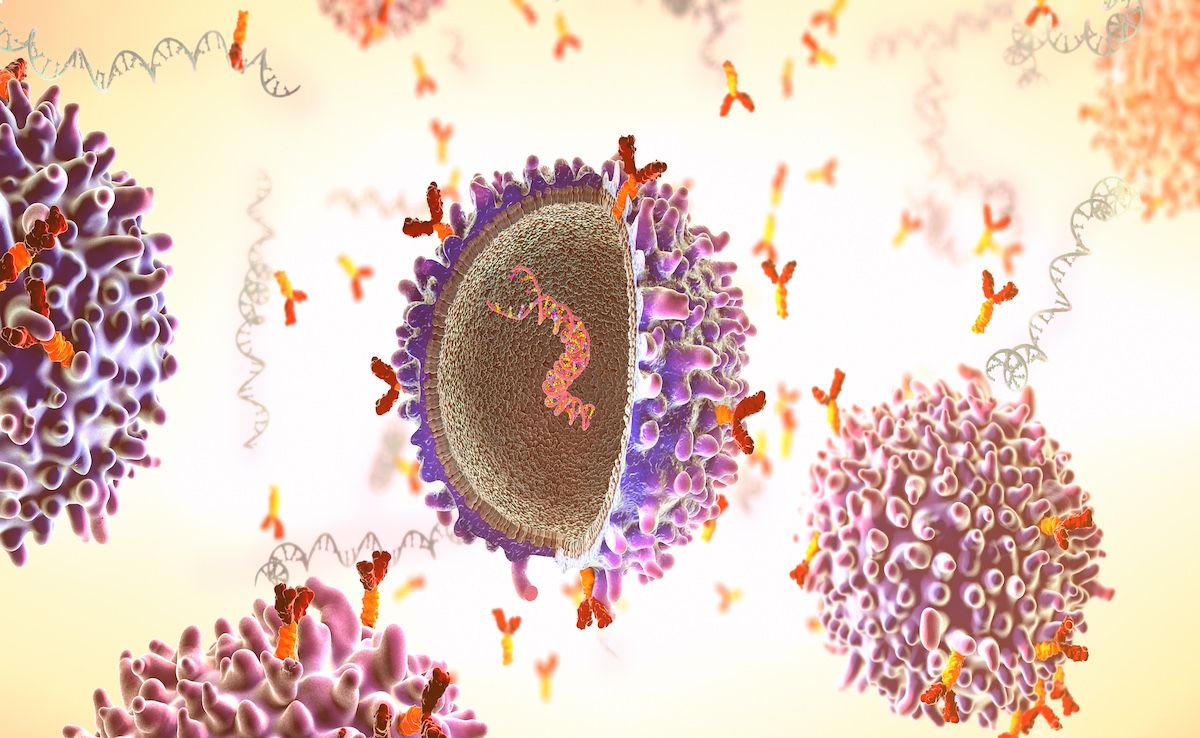- Center on Health Equity & Access
- Clinical
- Health Care Cost
- Health Care Delivery
- Insurance
- Policy
- Technology
- Value-Based Care
B-Cell Activating Factor Receptor CAR T Therapy Holds Promise for CLL
B-cell activating factor receptor chimeric antigen receptor (CAR) T-cell therapy caused cytotoxic effects on all chronic lymphocytic leukemia (CLL) cell lines.
B-cell activating factor receptor (BAFF-R) chimeric antigen receptor (CAR) T-cell therapy incited cytotoxic effects on both chronic lymphocytic leukemia (CLL) cell lines and primary B cells derived from CLL patients, according to a study published in MedComm.1 The CAR T cells also demonstrated cytotoxicity against CD19-knockout CLL cells that are resistant to CD19 CAR T therapy.
“We hypothesized that BAFF-R CAR T-cell therapy would be well-suited for CLL. We confirmed that we are able to generate BAFF-R CAR T cells, which consistently met established quality control (QC) standards. Most significantly, we showed the efficacy of these BAFF-R CAR T cells against three CLL cell lines, CD19-knockout (KO) CLL cells, and primary tumor cells from CLL patients. Furthermore, we developed BAFF-R CAR T cells from CLL patients and demonstrated their cytotoxicity against CLL tumor cells in an autologous context,” the authors stated.
Researchers confirmed the cytotoxicity of BAFF-R CAR T cells against 3 CLL cell lines | Image Credit: © Christoph Burgstedt - stock.adobe.com

The study found that CD4+ and CD8+ CAR T cells showed antigen-specific activation against Nalm-6 Wild type (WT), as evidenced by an increased CD107a expression. A lack of T-cell activation against BAFF-R-KO Nalm-6 confirmed the antigen-specific functionality of the BAFF-R CAR T cells. BAFF-R CAR T showed a significant release of IFN-γ when incubated with Nalm-6 WT, but not with BAFF-R-KO Nalm-6 cells. BAFF-R CAR T cells retained their cytotoxicity against CD19-KO CLL cells.
Researchers confirmed the cytotoxicity of BAFF-R CAR T cells against 3 CLL cell lines (MEC-1, HG-3, and CII) by the measured significant release of IFN-γ, compared with the non–CAR T group.
Researchers developed a second-generation BAFF-R CAR from small blood samples collected from patients with CLL. Their manufacturing processes consistently produced high-quality BAFF-R CAR T cells and reproducible batches that met established QC standards, according to the study. The antigen-specific cytotoxicity of BAFF-R CAR T cells was evaluated using BAFF-R-positive (WT) and BAFFR- negative (BAFF-R-KO) Nalm-6 cells. As a control, non-CAR T cells were used.
CLL is the most common leukemia in Western countries, with 18,740 new cases reported in the US in 2023, according to the study. CLL remains largely an incurable disease. Allogeneic hematopoietic cell transplantation (allo-HCT) remains problematic because of factors such as advanced age, existing comorbidities, and lack of a suitable donor, and risks following hematopoietic cell allografting that include developing acute and/or chronic graft-vs-host disease, infections, and transplant mortality.
Currently, there is no approved CAR T-cell therapy for patients with CLL. CAR T-cell therapy programs the patient's T cells, a type of immune system cell, to attack proteins on the surface of cancer cells, according to the National Cancer Institute.2 Special receptors are added to the surface of the patient’s T cells in a laboratory and the changed cells are referred to as CAR T cells.
“We designed a proof-of-concept study that would isolate both T cells and B cells from CLL patient blood samples.We first confirmed BAFF-R expression on B cells from CLL patient and then successfully generated CLL patients derived CAR T cells that were functionally tested against both BAFF-R-positive cell lines and autologous primary tumor cells. The cytotoxicity of three patient-derived CAR T cells against autologous primary B cells confirms our hypothesis that BAFF-R CAR T cells treatment holds a promise as an effective therapy for CLL patients. These results highlight the feasibility and anti-tumor efficacy of CLL patient-derived CAR T cells in a clinical context,” the authors wrote.1
References
1. Qie Y, Gadd ME, Shao Q. Targeting chronic lymphocytic leukemia with B-cell activating factor receptor CAR T cells. 2024;5:e716. MedComm. doi:10.1002/mco2.716
2. Chronic lymphocytic leukemia treatment. National Cancer Institute. Accessed September 11, 2024. https://www.cancer.gov/types/leukemia/patient/cll-treatment-pdq
